Dzogchen Monastery

Dzogchen Monastery is one of the Six Great Seats of the Nyingma school, the Old Translation school, of Tibetan Buddhism. It is the most important and influential institution of the Dzogchen lineage. His Eminence the 7th Dzogchen Rinpoche, Jigme Losel Wangpo, has re-established Dzogchen Monastery in south India, to preserve the unbroken lineage of Padmasambhava and the Dzogchen Khandro Nyingthig. Dzogchen Monastery, south India is the current seat of the Dzogchen Rinpoches and a flourishing centre of dharma and charitable activity.
Dzogchen Monastery in Tibet
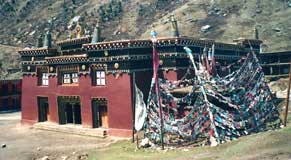
Dzogchen Monastery, Tibet
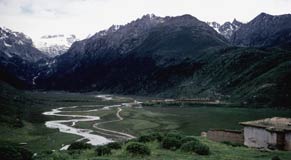
Dzogchen Valley, Tibet
The original Dzogchen Monastery in Tibet was established in 1684, by Pema Rigdzin, the 1st Dzogchen Rinpoche. Dzogchen Monastery was renowned for its college, the Shri Singha Shedra, named after the Dzogchen master Shri Singha, who sat down on a rock in the Rudam Valley of Tibet and left a miraculous imprint. In the 19th century, on that very spot, Gyalse Shenpen Thaye, a celebrated scholar and disciple of the 4th Dzogchen Rinpoche, Migyur Namkhe Dorje, built the Shri Singha Shedra. The 4th Dzogchen Rinpoche was the master of Patrul Rinpoche, Ju Mipham and many other great masters.
Dzogchen Monastery was equally renowned for its retreat centres and ritual traditions, in particular the sacred art of lama dancing. During the time of the 5th Dzogchen Rinpoche Thupten Chokyi Dorje, (1872-1935), up to one thousand monks attended Dzogchen Monastery; there were 13 retreat centres and an estimated 280 branches housing tens of thousands of lamas, tulkus, khenpos and monastic sangha.
Reconstruction of Dzogchen Monastery
Dzogchen Monastery in Tibet was destroyed by fire in 1950 during the Cultural Revolution. In the late 1980's, at the request of H.H. the 14th Dalai Lama, Tenzin Gyatso, His Eminence' late father, Tsewang Paljor, a great practitioner and expert in Tibetan architecture, began construction of Dzogchen Monastery in the Dhondenling settlement, south India. The rebuilding of the Shri Singha Shedra, the most influential centre of learning in the Nyingma school of Tibetan Buddhism, was completed in December 1991.
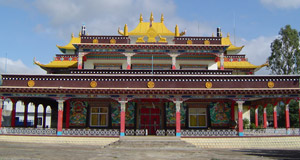
Dzogchen Monastery Temple, Dzogchen Monastery, India
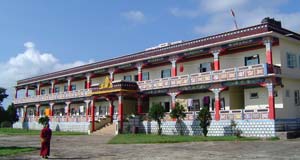
Shri Singha Shedra, Dzogchen Monastery, India
In the 1980's, following the request of His Eminence Dzogchen Rinpoche, Tulku Pegyal, a highly respected Dzogchen lama, came to Dzogchen Monastery from Tibet. Tulku Pegyal held great knowledge of the ritual Dzogchen practices and lead the Drupde, the monastery's retreat centre and the Dratsung, the ritual department. His Eminence then requested Tulku Pegyal to travel to Nepal to establish Dzogchen Gön Thubten Do Ngag Shedrub Dargye Ling, a branch of Dzogchen Monastery and the two monasteries remain closely connected.
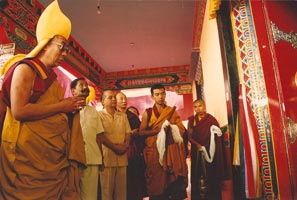
H.H. the 14th Dalai Lama and H.E. Dzogchen Rinpoche at Dzogchen Monastery inauguration in 1992
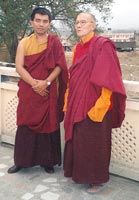
H.E. Dzogchen Rinpoche and Tulku Pegyal
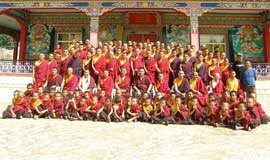
H.E. Dzogchen Rinpoche and the monks of Dzogchen Monastery, India
In 1992, H.H. the 14th the Dalai Lama formally inaugurated Dzogchen Monastery and returned in 2000 bestowing teachings from Longchenpa's Samten Ngalso and Semnyi Ngalso and a long life empowerment and blessing of Drupchen Thangtong Gyalpo to the monastic and lay community. H.H. Penor Rinpoche, H.H. Sakya Trinzin, H.H. the 17th Karmapa and many other great masters, from all Tibetan Buddhist schools, have visited.
Home to both the Dzogchen Shri Senha Charitable Society (DSSCS) and the Vidradharya Healing Clinic, Dzogchen Monastery has become a much needed focal point and support centre for the Dhondenling settlement. It is both a centre of excellence for Dzogchen scholarship and ritual and a source of charitable activity that benefits all sentient beings.
